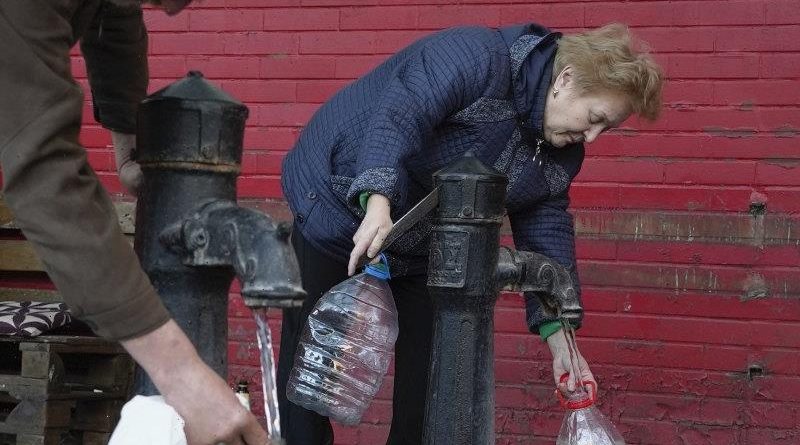Kyiv residents forced to line up at ancient wells after Russia knocks out water
Kyiv: The latest Russian assault on Ukraine’s civilian infrastructure left most of Ukraine’s capital without running water, forcing residents to line up by the thousands at old stone water wells in the ancient heart of Kyiv and at metal spigots in marketplaces across the metropolis.
Eighty per cent of the city was without water on Monday, after Russia launched dozens of cruise missiles at Ukraine, although that outage figure was cut in half by evening, officials said. The barrage – like many recently – appeared aimed largely at depriving people not just of fresh water but of electricity and heat. Hundreds of thousands of people in Kyiv lost power, as did many residents in other cities.
People fill containers with water from public water pumps in Kyiv, Ukraine, on Monday.Credit:AP
Maksym Khaurat, 31, said he, his wife and their newborn baby Miroslava had already been enduring rolling blackouts, a lack of heat in their apartment and a failing internet connection. The loss of water was different. For the first time, they were unable to fill a glass with water from the tap, take a shower or flush a toilet.
“We can live without heat and light,” he said as he waited to fill a water container.
Khaurat said he was having second thoughts about having returned to the city after relocating to western Ukraine earlier this year. “We have a lot of decisions to be made,” he said.
Russia’s Ministry of Defence claimed in a statement that it had taken aim at “the military control and energy systems of Ukraine”. In recent weeks, as Russian forces have lost ground in the south and east, they have sharply increased attacks on civilian infrastructure across the country, in an apparent attempt to break Ukrainians’ will by making their cities and towns unlivable.
People fill containers with water from public water pumps in Kyiv.Credit:AP
Before those missile and drone barrages began, many people who had fled Kyiv early in the war returned, along with much of the city’s daily activity and energy.
The blows to the water system drove many people back to the age-old practice of trudging with their own containers to old communal wells or public taps. But Khaurat’s mood, like that of many of his compatriots, was one of defiance, not defeat, in the face of the war waged by Russian President Vladimir Putin.
“I am angry,” he said. “Angry at that man in Russia. I hate him.”
This article originally appeared in The New York Times.
Most Viewed in World
From our partners
Source: Read Full Article





